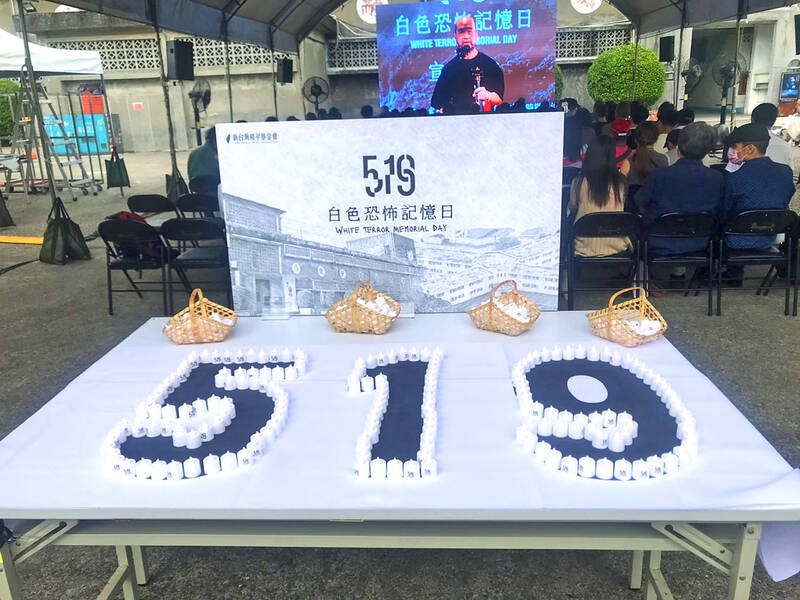Ten properties worth more than NT$200 million (US$6.21 million) in total that were taken from political prisoners during Taiwan’s White Terror era have been returned to the families of the victims over the past year, a foundation said yesterday.
The White Terror era refers to the suppression of political dissidents following the 228 Incident, an uprising that began on Feb. 28, 1947, which was brutally suppressed by the then-Chinese Nationalist Pary (KMT) regime. The government subsequently imposed martial law, which was lifted on July 15, 1987.
Yesterday was Taiwan’s first White Terror Memorial Day. Outgoing Premier Chen Chien-jen (陳建仁) last month announced that it would be observed annually on May 19.

Photo: Chen Yi-shan, Taipei Times
“The return of confiscated property to the families of political prisoners is an important step toward the restoration of rights,” Restoration of Victim’s Rights Infringed by Illegal Acts of the State During the Period of Authoritarian Rule Foundation chairperson Chang Wen-chen (張文貞) said.
Confiscated buildings and land still registered as state property would be returned to victims’ families whenever legally possible, such as when the properties become vacant or are being rented, she said, adding that in many cases the original owners of the properties were unjustly killed or imprisoned.
The foundation was set up by the Executive Yuan in line with the Act to Restore Victims’ Rights Infringed by Illegal Acts of the State During the Period of Authoritarian Rule (威權統治時期國家不法行為被害者權利回復條例).
Since September last year, when the foundation was established, it has returned 10 properties, Chang said.
Political prisoners who had their property taken during the Martial Law era were often charged with crimes under the now-repealed Punishment of Rebellion Act (懲治叛亂條例), she said.
Article 8 of the Punishment of Rebellion Act stipulated that anyone found guilty of crimes described in it would have their property confiscated, excluding what was necessary to cover the living expenses of that person’s dependent family members.
One property that was returned to a victim’s victim’s spouse and children over the past year was a building in Kaohsiung that was being rented out by the government, Chang said.
The family’s original ownership of the property was confirmed, and the Ministry of the Interior authorized the transfer, she said.
“There was also a really special case of a political prisoner who is still alive and was able to have his property returned to him,” she said. “The man was very young when he was arrested and his property was taken from him. Now he is in 80s.”
Foundation CEO Sun Pin (孫斌) said that during the Martial Law era, confiscated properties would change hands within the government.
After the state confiscated the property it would first be registered to the Taiwan Garrison Command, he said, adding that if the Taiwan Garrison Command did not want to use the property, it would be transferred to the National Property Administration or local government.
In one case, involving writer, human rights activist and former political prisoner Bo Yang (柏楊), books rather than real-estate were confiscated, but were lost, Sun said.
The foundation gave Bo’s family NT$6,000 for the books, he said.
“Although only books were confiscated from Bo Yang, the case has special symbolic significance. The family members believed that everything the country took from Bo should be returned,” he said.

Taiwan has received more than US$70 million in royalties as of the end of last year from developing the F-16V jet as countries worldwide purchase or upgrade to this popular model, government and military officials said on Saturday. Taiwan funded the development of the F-16V jet and ended up the sole investor as other countries withdrew from the program. Now the F-16V is increasingly popular and countries must pay Taiwan a percentage in royalties when they purchase new F-16V aircraft or upgrade older F-16 models. The next five years are expected to be the peak for these royalties, with Taiwan potentially earning

STAY IN YOUR LANE: As the US and Israel attack Iran, the ministry has warned China not to overstep by including Taiwanese citizens in its evacuation orders The Ministry of Foreign Affairs (MOFA) yesterday rebuked a statement by China’s embassy in Israel that it would evacuate Taiwanese holders of Chinese travel documents from Israel amid the latter’s escalating conflict with Iran. Tensions have risen across the Middle East in the wake of US and Israeli airstrikes on Iran beginning Saturday. China subsequently issued an evacuation notice for its citizens. In a news release, the Chinese embassy in Israel said holders of “Taiwan compatriot permits (台胞證)” issued to Taiwanese nationals by Chinese authorities for travel to China — could register for evacuation to Egypt. In Taipei, the ministry yesterday said Taiwan

Taiwan is awaiting official notification from the US regarding the status of the Agreement on Reciprocal Trade (ART) after the US Supreme Court ruled US President Donald Trump's global tariffs unconstitutional. Speaking to reporters before a legislative hearing today, Premier Cho Jung-tai (卓榮泰) said that Taiwan's negotiation team remains focused on ensuring that the bilateral trade deal remains intact despite the legal challenge to Trump's tariff policy. "The US has pledged to notify its trade partners once the subsequent administrative and legal processes are finalized, and that certainly includes Taiwan," Cho said when asked about opposition parties’ doubts that the ART was

If China chose to invade Taiwan tomorrow, it would only have to sever three undersea fiber-optic cable clusters to cause a data blackout, Jason Hsu (許毓仁), a senior fellow at the Hudson Institute and former Chinese Nationalist Party (KMT) legislator, told a US security panel yesterday. In a Taiwan contingency, cable disruption would be one of the earliest preinvasion actions and the signal that escalation had begun, he said, adding that Taiwan’s current cable repair capabilities are insufficient. The US-China Economic and Security Review Commission (USCC) yesterday held a hearing on US-China Competition Under the Sea, with Hsu speaking on